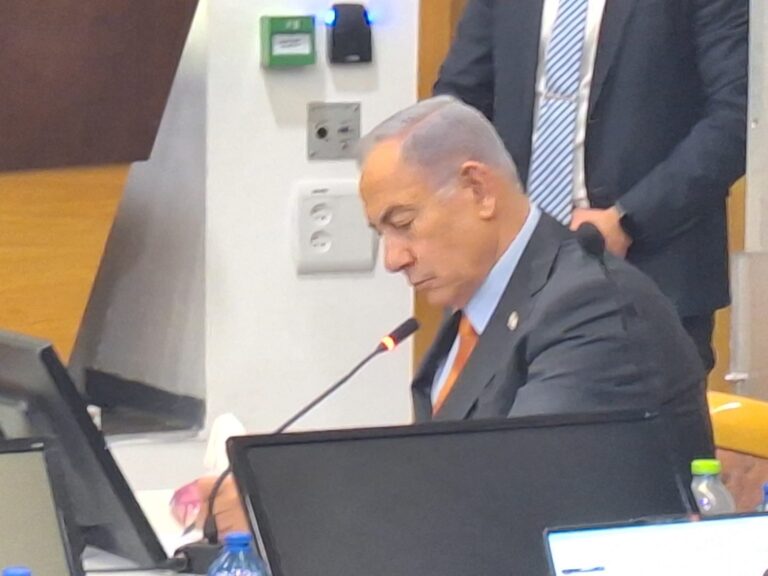 Retired High Court Justice Yehoshua Matza convened a press conference on Tuesday to announce the findings of the government-appointed investigation into the state’s handling of the Gush Katif and N. Shomron expellees, close to 10,000 in number, who were uprooted from their homes in the carrying out of the 2005 so-called Disengagement plan, during the administration of Ariel Sharon. The report points a finger at the administrations since 2005, that of Ariel Sharon and his successor, Ehud Olmert.
Retired High Court Justice Yehoshua Matza convened a press conference on Tuesday to announce the findings of the government-appointed investigation into the state’s handling of the Gush Katif and N. Shomron expellees, close to 10,000 in number, who were uprooted from their homes in the carrying out of the 2005 so-called Disengagement plan, during the administration of Ariel Sharon. The report points a finger at the administrations since 2005, that of Ariel Sharon and his successor, Ehud Olmert.
Matza stated that the litmus test are the results, not intentions, and in this case, there can be no doubt other than acknowledging the colossal government failure regarding the victims of the expulsion. Matza spoke of the legal, moral and social responsibilities towards the expellees, to assist them in rebuilding their lives.
Some of the expellees were 30-year residents of the area, and they were torn from their homes and communities, and the most elementary responsibility of the government was to see to it that their lives are rehabilitated, but in most cases, this did not happen.
“We are close to 5 years since the disengagement from Gaza and the N. Shomron… and on 29 September we released an interim report to all relevant agencies.
On January 7, 2009, the Knesset Audit Committee decided to appoint a state investigation committee. It took some time until the parameters of the committee’s authority were detailed, delaying its work for a bit over a month. It also took some time to prepare the elementary logistical requirements, including office supplies and equipment.
It has been six years since the cabinet voted to implement the disengagement plan on June 6, 2004.
The committee used strong terms to describe the level of governmental failure, and points out that the overwhelming number of the expellees is still living in caravan homes and temporary living conditions. The committee acknowledges that we are incapable of returning the expellees to their former status, but that realized, the state must do its utmost to rehabilitate their lives as much as possible, including homes, jobs, schools and all that is encompassed in a normal life as they knew before.
Unemployment among the expellees is approximately double the national average, including those who received government compensation, but nevertheless, it is evident they have not succeeded in reestablishing their lives in a community and slowly, the compensatory funds deteriorated and they were compelled to use them to live. There are many family and personal crises as a result of their harsh realities. When handing the report to Knesset Speaker Reuven Rivlin, Matza stressed the alarming rate of unemployment among expellees.
The committee points out that its mandate differs somewhat from other committees with a mandate to investigate since it is not probing a past event, but present life, conditions that exist today. The committee gathered testimony from close to 400 people, holding 38 public meetings during which 150 people were interviewed, some more than once. Committee members toured areas pertinent to the report, the caravan communities and so-forth.
It is important to remember that the committee did not address the merit of the disengagement per se, since this is not the committee’s mandate, and it is a political matter, the result of a cabinet decision.
In the macro picture, the state failed to meet its elementary responsibilities towards rehabilitating the expellees.
The committee’s almost 500 page report places the blame on state agencies, but it does not permit expellees to evade accepting blame for their unacceptable predicament, explaining in many cases, they were simply uncooperative, perhaps refusing to take steps to help themselves when possible, and making unreasonable demands.
The committee calls for making the rehabilitation of the expellees a national priority, praising Eyal Gabbai, the director-general of the Prime Minister’s Bureau, who has made the situation a priority since the current administration assumed office a bit over a year ago. The committee sets a deadline of the end of 2011 for the government to place most of the evacuees in permanent housing; a deadline many feel is noble, but less than realistic. (End of Justice Matza’s words)
In response, Prime Minister Binyamin Netanyahu announced he will continue addressing the needs of the expellees and his administration will do its utmost to meet the state’s deadline.
To date, over 10 billion shekels has been spend on assisting and supporting he expellees, and together with the terrorist threat existing in Gaza today, many are questioning why the persons responsible are not held accountable for their decision, one that has ruined many lives and placed the Greater Southern Israel well within Hamas rocket range, a far cry from the visions of grandeur described ahead of the disengagement by then Prime Minister Ariel Sharon.
(Yechiel Spira – YWN Israel)











4 Responses
10 billion dollars?!?!?!
That’s 10,000,000,000$ for 9,000 people= 1,111,111.11$ per person. So a family of 5 would have received 5,555,555.00$ in aid?
How can that be?!
Its a shame we all remember it what Sharon did to over10 000 pepole and b”h he got his
The Israeli government under Sharon and later Olmert did everything it could to make the people of Gush Katif look bad, and they, the government, look good.
The government was viewed by the public as the wrongdoer, and the Gush Katif people as the victim. The government did nothing to help them, since through these (innocent) people they who were in power looked (and smelled) bad.
It is a situation of the attacker making the victim suffer for his (the attacker’s) crime.
10 billion shekel not dollars. Big difference.